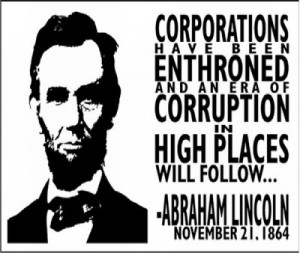Welcome to DU!
The truly grassroots left-of-center political community where regular people, not algorithms, drive the discussions and set the standards.
Join the community:
Create a free account
Support DU (and get rid of ads!):
Become a Star Member
Latest Breaking News
Editorials & Other Articles
General Discussion
The DU Lounge
All Forums
Issue Forums
Culture Forums
Alliance Forums
Region Forums
Support Forums
Help & Search
General Discussion
Showing Original Post only (View all)How the Trans-Pacific Partnership Would Undermine Internet Freedom [View all]
How the Trans-Pacific Partnership Would Undermine Internet Freedom
Remember SOPA - the "copyright" legislation before Congress last year that public outcry stopped cold? Well, the same corporations behind SOPA have pushed to insert its most pernicious provisions into TPP. Says who? The organizations that stopped SOPA like the Electronic Freedom Foundation and the ACLU.
Under this TPP proposal, Internet Service Providers could be required to "police" user activity (i.e. police YOU), take down internet content, and cut people off from internet access for common user-generated content.
Violations could be as simple as the creation of a YouTube video with clips from other videos, even if for personal or educational purposes....Mandatory fines would be imposed for individuals' non-commercial copies of copyrighted material. So, downloading some music could be treated the same as large-scale, for-profit copyright violations.
Innovation would be stifled as the creation and sharing of user-generated content would face new barriers, and as monopoly copyrights would be extended. The TPP proposes to impose copyright protections for a minimum of 120 years for corporate-created content... Breaking digital locks for legit purposes, such as using Linux, could subject users to mandatory fines. Blind and deaf people also would be harmed by this overreach, as digital locks can block access to audio-supported content and closed captioning.
http://www.exposethetpp.org/TPPImpacts_InternetFreedom.html
So, is 120 years really what the framers had in mind, when writing the Constitution?
Article One, section 8, clause 8:
"The Congress shall have power ... To promote the progress of science and useful arts, by securing for limited times to authors and inventors the exclusive right to their respective writings and discoveries."
http://en.wikipedia.org/wiki/United_States_patent_law
Is 120 years the appropriate "limited time" term of copyright protection, given the framers stated goal of promoting "the progress of science and useful arts"?
EFF: All Nations Lose with TPP's Expansion of Copyright Terms
....corporate works that were not published within 25 years of its creation, are protected the term of protection is 120 years from the date of the creation.This provision expands the terms of the controversial US Sonny Bono Copyright Term Extension Act (or the “Mickey Mouse Act” as it was called due to Disney’s heavy lobbying) to countries of the Pacific region. New Zealand, a party to the TPP negotiations, currently has a copyright term of the author’s life and an additional 50 years for literary works. Another TPP member, Malaysia, has a copyright term of life plus 50 years for “literary, musical or artistic work.” Canada, which is just entering negotiations, has an even shorter term of just 50 years for fixed sound recordings. Pursuant to the current TPP terms [pdf], all of these countries would be required to extend their terms and grant companies lengthy exclusive rights to works for no empirical reason.
The common justification for granting restrictive monopoly rights in copyright law is to provide an “incentive” for people to generate material that can be enjoyed by the public. But economists and law scholars who have studied this rationale have found that “the optimal length of copyright is at most seven years.” . . . Long copyright terms are a poor recipe for compensating creators, who generally receive low royalties from their works.5 And yet, the strong copyright lobby prevents any recommendation to reduce the presently excessive terms, attacking any attempt to speak for the public domain or for users rights and dazzles politicians with nonsensical “copyright math”.
https://www.eff.org/deeplinks/2012/08/all-nations-lose-tpps-expansion-copyright-terms


16 replies
 = new reply since forum marked as read
Highlight:
NoneDon't highlight anything
5 newestHighlight 5 most recent replies
= new reply since forum marked as read
Highlight:
NoneDon't highlight anything
5 newestHighlight 5 most recent replies
How the Trans-Pacific Partnership Would Undermine Internet Freedom [View all]
Faryn Balyncd
Dec 2014
OP
Thank you and people are blindly supporting this because of partisan loyalty without even
sabrina 1
Dec 2014
#1
goal of obama,s TPP is to eliminate state and local regulatioNs that corporations don,t want nt
msongs
Dec 2014
#5
Guess that's what we get when the folks who wrote it are the same folks who put malware in CDs ...
Faryn Balyncd
Dec 2014
#7
TPP is a vehicle for the corrosive policies corporations could never achieve through legislation.
pa28
Dec 2014
#9
Just watched segment on MSNBC's Ed Schultz on TPP, NAFTA on Steroids with VT Rep. Difazio,
appalachiablue
Dec 2014
#16